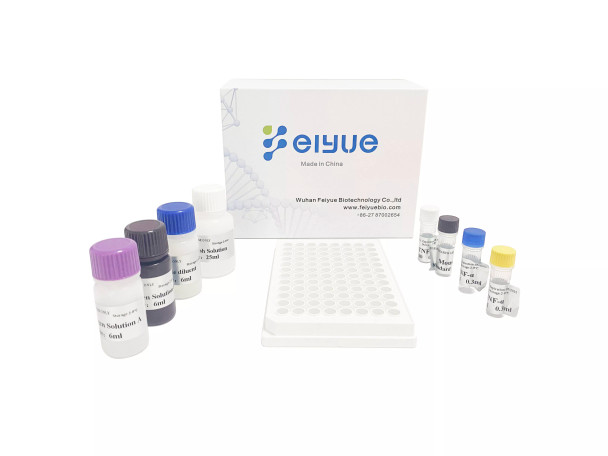Description
DA(Dopamine) ELISA Kit Basic Information
|
Product Name |
DA(Dopamine) ELISA Kit |
|
Catalog NO. |
FY-EU3722 |
|
Alias |
DA; Dopamine |
|
Detection Method |
Sandwich ELISA, Double Antibody |
|
Size |
48T, 96T |
|
Storage |
2-8 ℃ for 6 months |
|
Sensitivity |
<0.938ng/ml |
|
Species |
Universal |
|
CV %() |
Intra-Assay: CV<8% |
|
Note |
For Research Use Only |
Feiyue's DA(Dopamine) ELISA Kit is an ELISA reagent for detection of DA(Dopamine), plasma or cell with sensitivity, specificity and consistency.
DA(Dopamine) Introduction
Dopamine (DA, a contraction of 3,4-dihydroxyphenethylamine) is a neuromodulatory molecule that plays several important roles in cells. It is an organic chemical of the catecholamine and phenethylamine families. Dopamine constitutes about 80% of the catecholamine content in the brain. It is an amine synthesized by removing a carboxyl group from a molecule of its precursor chemical, L-DOPA, which is synthesized in the brain and kidneys. Dopamine is also synthesized in plants and most animals. In the brain, dopamine functions as a neurotransmitter—a chemical released by neurons (nerve cells) to send signals to other nerve cells. Neurotransmitters are synthesized in specific regions of the brain, but affect many regions systemically. The brain includes several distinct dopamine pathways, one of which plays a major role in the motivational component of reward-motivated behavior. The anticipation of most types of rewards increases the level of dopamine in the brain.
DA(Dopamine) ELISA Kit Test method
This kit uses sandwich ELISA to detect the concent ion of DA(Dopamine).DA(Dopamine)-specific monoclonal antibody has been pre-coated in the wells of the supplied microplate.Standards samples and controls are added to interact with the immobilizedantibody. A sandwich complex is formed by additional DA(Dopamine) antibody with HRP-Streptavidin.TMB solution is added to react with the sandwich forming optical signal measured by microplate reader.The concention of DA(Dopamine) in the sample can be calculated by comparing the absorbance of the sample with the standard curve.
References
1. Cruickshank L, Kennedy AR, Shankland N (2013). "CSD Entry TIRZAX: 5-(2-Ammonioethyl)-2-hydroxyphenolate , Dopamine". Cambridge Structural Database: Access Structures. Cambridge Crystallographic Data Centre. doi:10.5517/cc10m9nl. Retrieved 28 December 2020.
2. Cruickshank L, Kennedy AR, Shankland N (2013). "Tautomeric and ionisation forms of dopamine and tyramine in the solid state". J. Mol. Struct. 1051: 132–36. Bibcode:2013JMoSt1051..132C. doi:10.1016/j.molstruc.2013.08.002.
3."Dopamine: Biological activity". IUPHAR/BPS guide to pharmacology. International Union of Basic and Clinical Pharmacology. Retrieved 29 January 2016.
4.Berridge KC (April 2007). "The debate over dopamine's role in reward: the case for incentive salience". Psychopharmacology. 191 (3): 391–431. doi:10.1007/s00213-006-0578-x. PMID 17072591. S2CID 468204.
5. Malenka RC, Nestler EJ, Hyman SE (2009). Sydor A, Brown RY (eds.). Molecular Neuropharmacology: A Foundation for Clinical Neuroscience (2nd ed.). New York: McGraw-Hill Medical. pp. 147–48, 366–67, 375–76. ISBN 978-0-07-148127-4.
Additional Information
Size: |
96T |
Reactivity: |
Universal |
Assay range: |
1.563-100ng/ml |
Sensitivity: |
0.938ng/ml |






